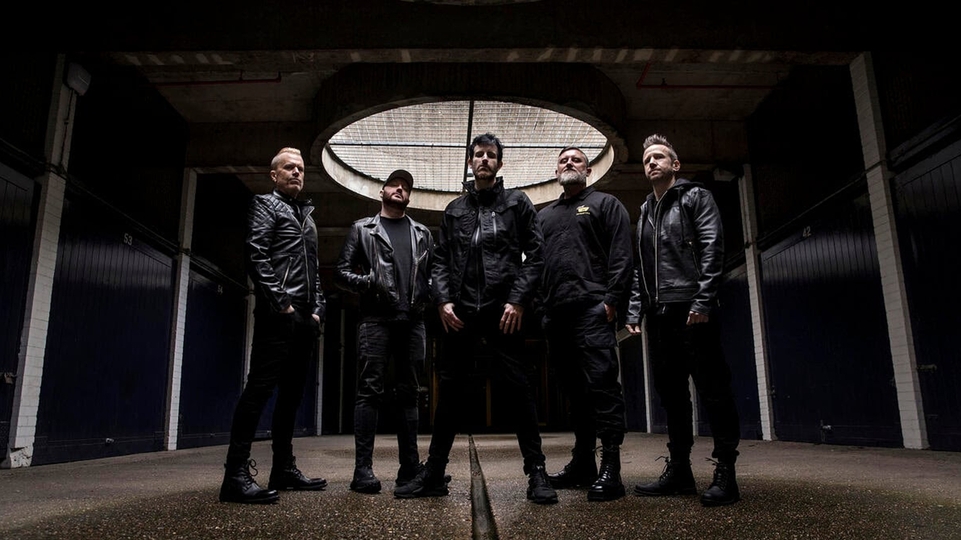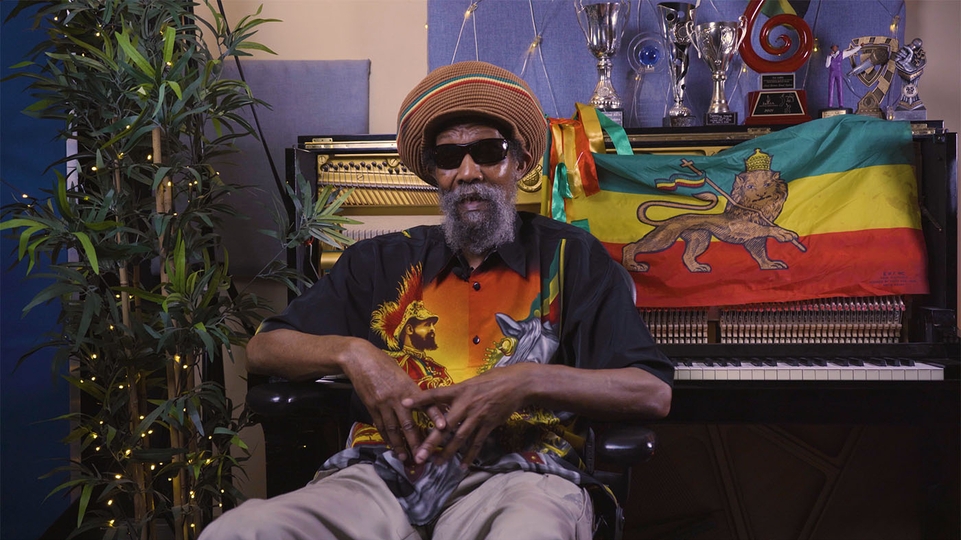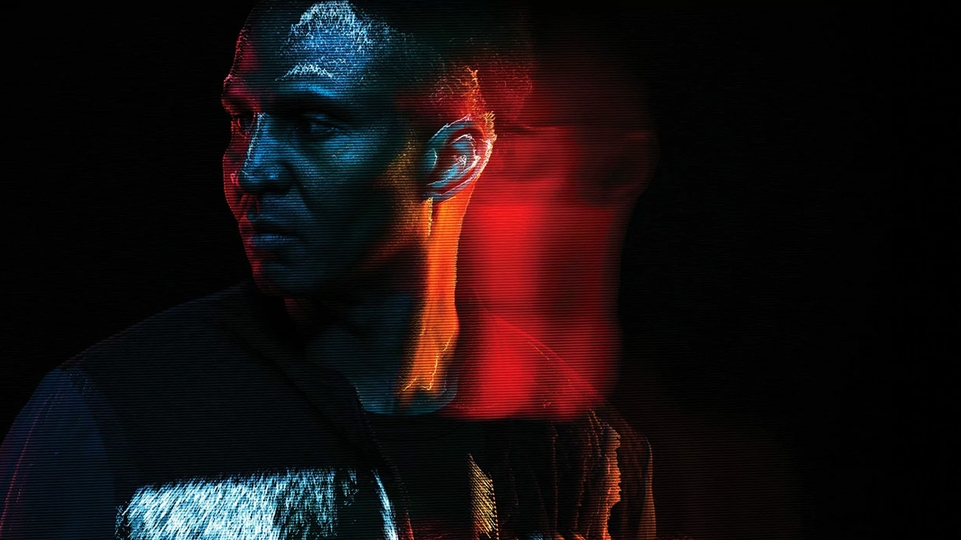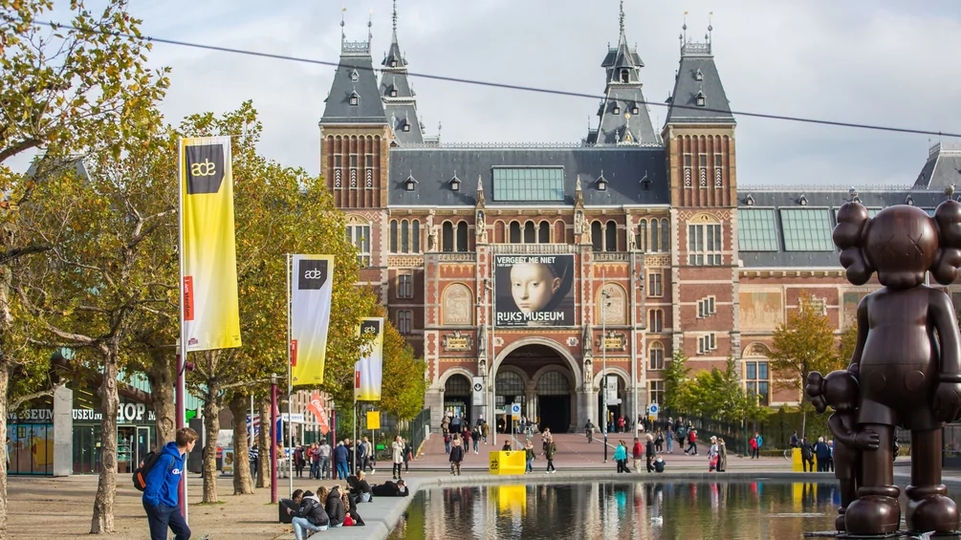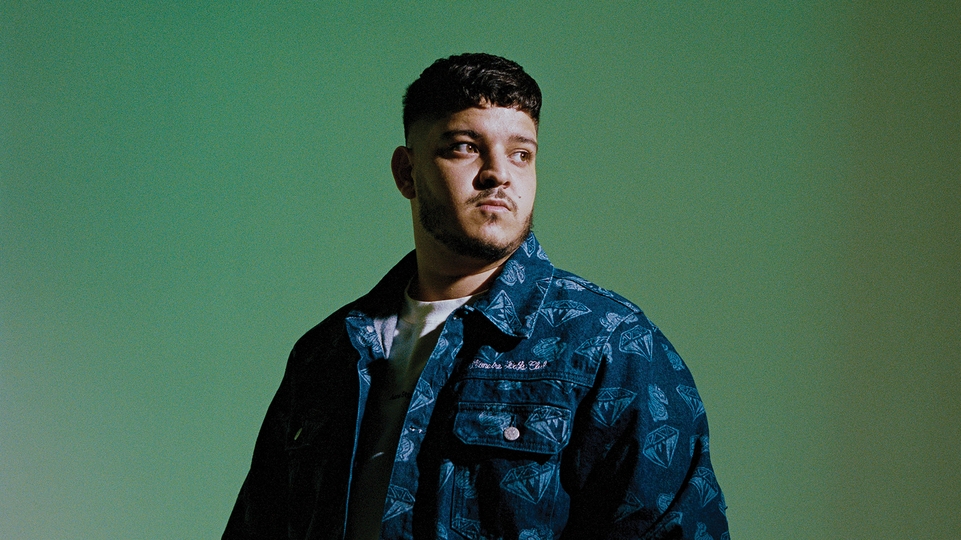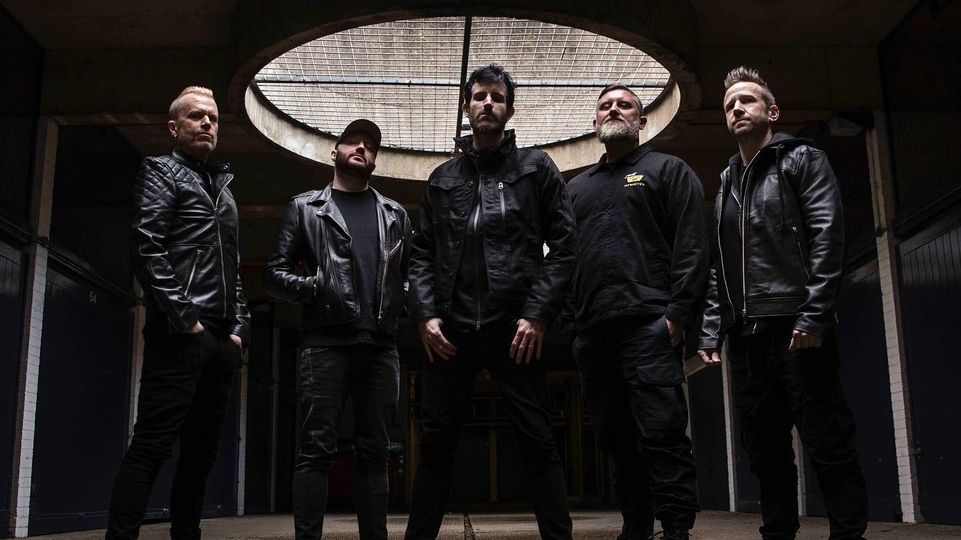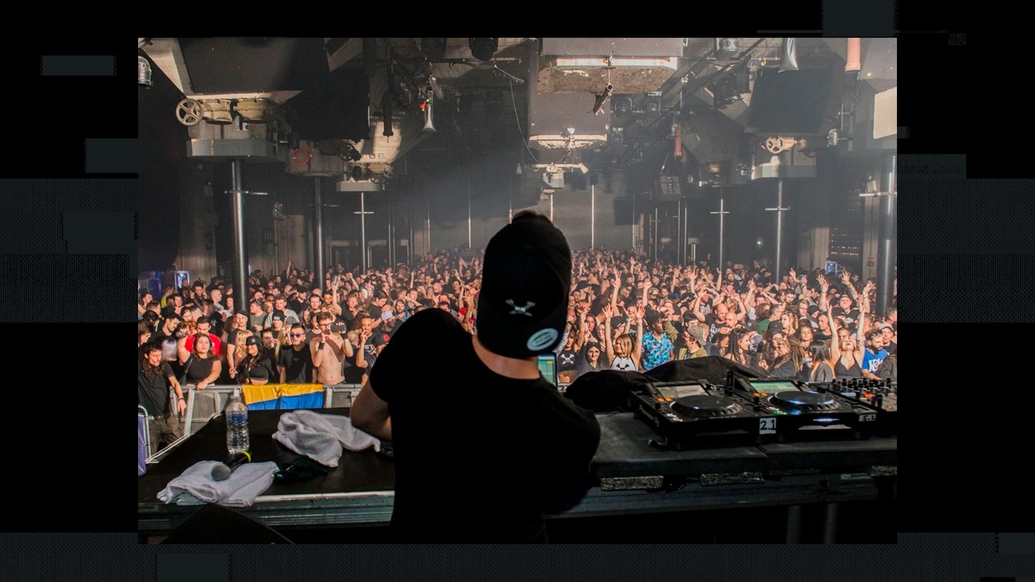
Hard noise: Rotterdam's PRSPCT brings anarchic punk energy to electronic music
With its label, events and booking agency, Rotterdam’s PRSPCT has brought an anarchic punk energy to dance music. Ben Hindle speaks to label artists about what makes PRSPCT such a liberating outlet, and chats to founder Gareth de Wijk, aka Thrasher, about ignoring rules, encouraging experimentation, and using your platform for good
“It’s the way you run your thing, the way you live your music, breathe it, man. That’s the punk thing... I think that PRSPCT is punk as fuck when it comes to the way we run.” It’s late February and Gareth de Wijk, otherwise known as Thrasher, is talking to DJ Mag from the office of his record label and event brand PRSPCT in Rotterdam. We’re discussing the term ‘punk’. Covered in tattoos, with heavy metal hoops in his ears and decked out in a black hoodie and cap, he certainly looks the part. And PRSPCT, a leading force in industrial-strength drum & bass and hammering alternative hardcore, certainly sounds it. But we’ve posed the question of what it really means to be punk in a scene as commercialised as dance music.
“The whole way I run this company and the label is based on what I learned in the DIY punk scene when I was young,” he continues. “The way we treat the artists, the way we treat our music, what we love about it, the attitude of it is all super punk — it’s just super DIY, fuck the rules. We’re not trying to chase this trend, or jump on the wagon; we’ve got our own fucking wagon.”
Launched in 2002 in the 350-capacity basement of Rotterdam’s now-shuttered Nighttown venue, PRSPCT has grown to incorporate a label with over 300 releases, XL parties that bring thousands to the city’s Maassilo warehouse, a booking agency, and a tight-knit family of outsider artists who like their electronic music HARD. Gareth’s own story, though, begins as an angry teenager who found his release in hardcore punk. “The power of that movement is that it’s not about how technically skilled you are. All you need to know is three chords, and you just fucking scream your heart and frustration out. And that’s what I did.”
Forming a band, playing in squats and basements, he became fully immersed in the Dutch DIY scene, learning everything he needed to know to push himself as a musician without depending on anybody else. “From the age of 14, I’ve been on a stage every weekend, ’cause on the stage I could be my alter-ego, my superhero version of myself — not the broken kid,” he says. “On the stage you’re like, ‘Fuck the world!’ To this day, I feel more comfortable on a stage in front of 10,000 people doing my thing than in a store trying on pants.”
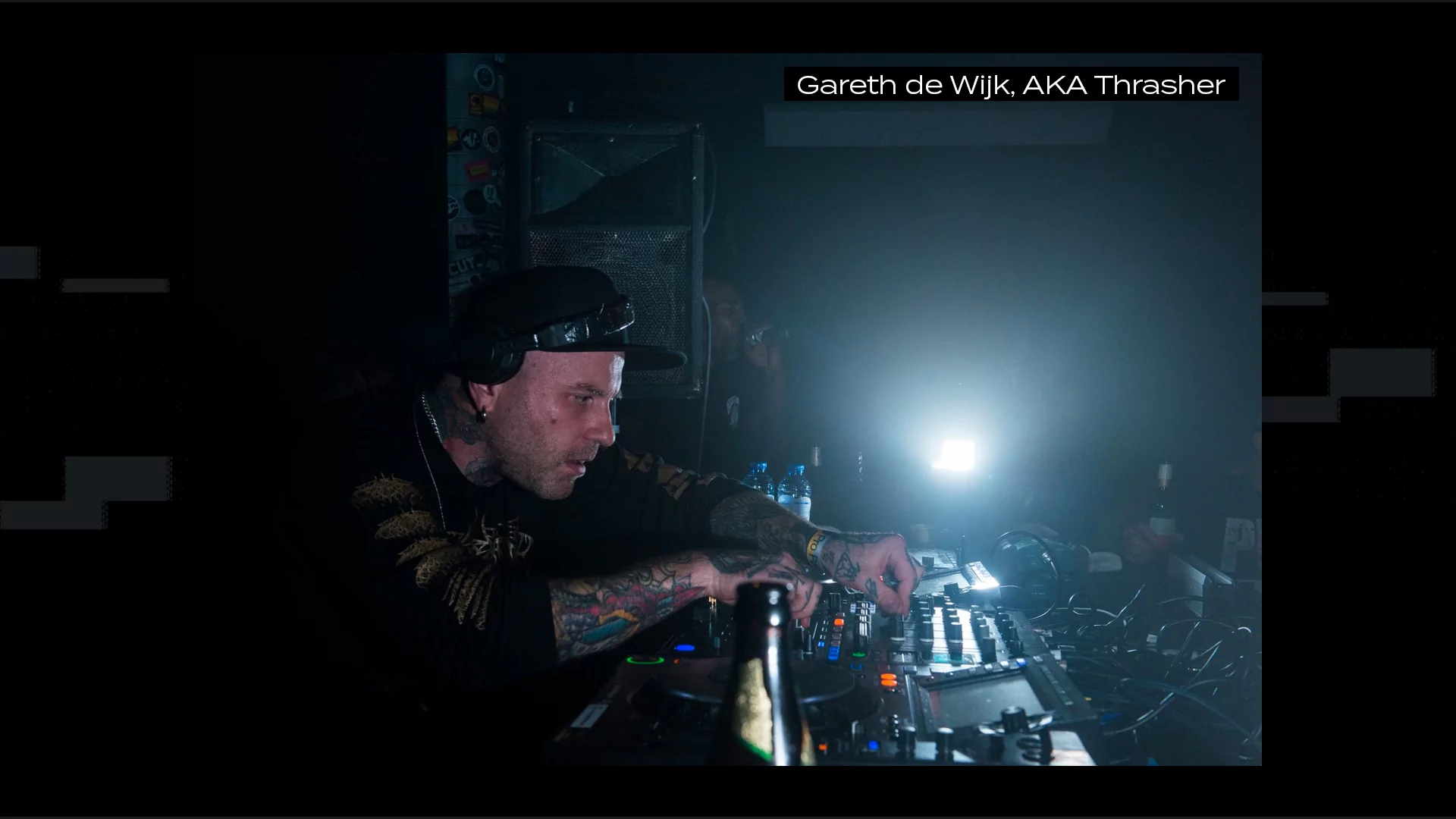
“The way we treat the artists, the way we treat our music, what we love about it, the attitude of it is all super punk — it’s just super DIY, fuck the rules. We’re not trying to chase this trend, or jump on the wagon; we’ve got our own fucking wagon.” – Gareth de Wijk, aka Thrasher
When he was 16, he started working in a record shop, which opened him up to a much wider range of music, before getting a job at Nighttown at 18. There his DIY attitude helped him take on various jobs, and he got more experience with electronic music through booking dance nights. “There were two genres of electronic music that I did like, one was hardcore/gabber and one was jungle,” he says. “I remember hearing [Goldie’s] ‘Timeless’ for the first time — it blew my fucking mind... The energy of jungle and drum & bass, for me it’s a punk rock beat.”
Hardcore also had the “rough, raw energy” he craved, but at the time had attracted “a lot of fuck-ups and right-wing”, which was totally at odds with the progressive politics he’d absorbed from the punk scene. He enjoyed booking the d&b nights, but there was just one problem, he thought the music could be “way harder”.
Though he’d never wanted to be a DJ, he got some turntables and learned to mix, straight away throwing hardcore and drum & bass together to achieve the no-holds-barred sound he was searching for. His first PRSPCT parties drew a few hundred people, but in 2004 they expanded to take over the main hall of Nighttown, and PRSPCT XL was born. “I remember booking [British d&b artists] Tech Itch and Dylan and 1,500 kids turning up, so I wasn’t the only one feeling it,” recalls Gareth. Though drum & bass was the dominant sound, he was also booking hardcore elements like Dutch legends The Outside Agency. “Those worlds were separated, and all of a sudden [they] started connecting,” says Gareth.
A crew began forming immediately. Adi-J had come to the Netherlands from Israel and was a resident for UK d&b institution Renegade Hardware; she met Gareth via label boss Clayton Hines. “I met this kid who was relentless, and super stubborn to bring only the hard side of drum & bass — and he made it big time,” she says. “I’m an Amsterdam girl, but... I was hanging out with a lot of Rotterdam people, doing collaborations and parties. The second I met Gareth, that’s it — I was hooked to him and to everything he was doing.”
MC Dart was an early joiner too. “Gareth, he didn’t like MCs, he never wanted MCs at PRSPCT. Then he got to know me and he was like, ‘Actually, this guy gets it and he’s pretty good’,” he recalls fondly. “What I always liked about PRSPCT, and it was there from the beginning, was the diversity of people. The whole no concessions attitude: we do what we want, we play what we want, we book who we want... it broke barriers.”
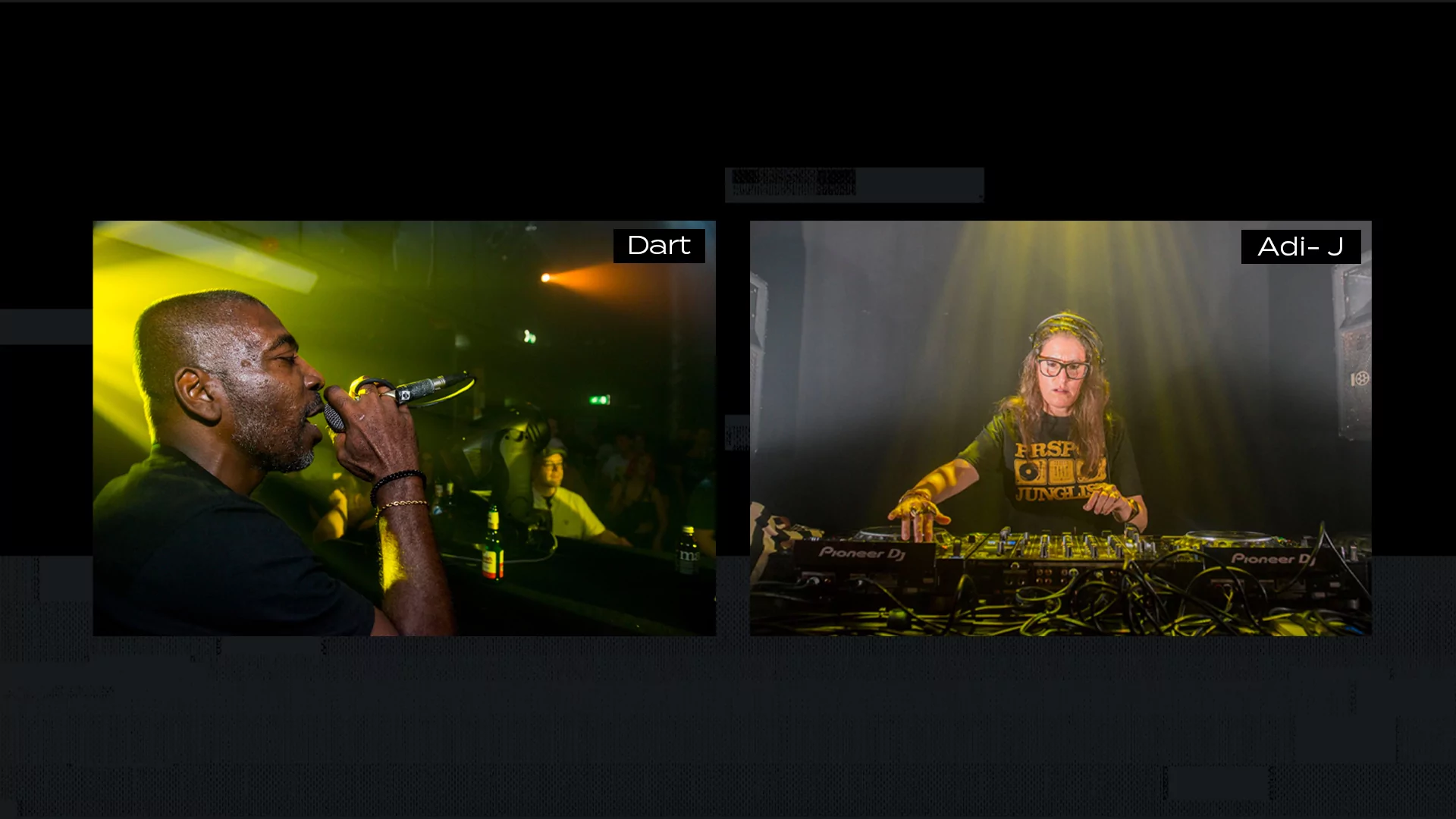
In 2005, PRSPCT became a label. The debut release featured DJ Hidden’s ‘The Resonators’, a juggernaut built from taut beats and a bassline coarse enough to strip the paint off the walls. But what really made the track stand out was its industrial hardcore breakdown — grossly distorted four-to-the-floor kicks erupting from ominous ambience. A rarity at the time, it was a reflection of the sounds and ideas merging on the dancefloors and backstage at PRSPCT XL, and a sign of things to come. On the flip was the maniacal, hyperspeed cut ‘Pain’ from a young Ukrainian producer called Limewax. Now an icon in the hard drum & bass scene, Limewax has remained a PRSPCT staple and put out two albums with the label, with a new EP on the way in May. “Sound-wise, Gareth always made sure to leave enough room [to experiment] in any direction,” Limewax says of what makes the label a good home for his music. “I never had to make an effort for a ‘PRSPCT’ type of sound... it’s been a glide from the start and it’s still equally as exciting to do a next one for the label.”
Over the rest of the ’00s, the label grew in strength, releasing music from South African d&b champions Counterstrike, Eye-D (the other half of The Outside Agency alongside DJ Hidden), Germany’s The Panacea and more. PRSPCT’s XL events evolved too, moving to Waterfront, then on to WATT club, where Gareth had begun working as a promoter. Along the way, XL hosted a who’s who of hard drum & bass, hardcore, breakcore and jungle acts — from French industrial don Manu le Malin to seminal d&b producer Dom & Roland, and even a little-known trio called Noisia way back in 2006. When WATT was shut down, Gareth decided he’d had enough of working for others and put all his effort into PRSPCT.
From 2011, a flurry of sub-labels was launched, each focusing on a different sound. PRSPCT SUB handled dubstep, while RVLT was all about breakcore, becoming a home for the twisted stylings of Deformer and junglists like FFF and Coco Bryce. Most successful though was XTRM, a hardcore hub that had its ribbon cut by UK hardcore techno stalwart The DJ Producer and Dutchman Bong-Ra. “The hardcore scene back then was really in a dip, it was fucking boring shit. As soon as we started PRSPCT XTRM, suddenly there was this big platform for alternative hardcore, and suddenly all the hardcore festivals wanted PRSPCT stages, and you get all the hardcore people wanting it,” Gareth tells us. Putting out over 70 releases across its physical and digital series, XTRM nurtured the likes of Somniac One and brought legends like Deathchant boss Hellfish and I:gor into the fold.
The DJ Producer still remembers meeting Gareth ahead of playing his first XL party in 2008: “Here at Schiphol [airport] was this tattooed guy, sweary and smoking — all the bad things most Dutch promoters aren’t — and I loved him instantly.” When Gareth came calling for a release a few years down the line, it was a no-brainer. “Almost from the start of my production career, I had a very clear vision of how I wanted the music I make [to sound],” says Producer, whose credentials stretch back to the earliest days of UK rave.
“Take the speed of hardcore and the high-powered breakbeats and production values of drum & bass, and interweave some airy, melodic, almost trance-like elements — this is our vision of UK hardcore,” he continues. “Add or subtract elements to taste, but that’s the template. And when PRSPCT came to me and described what the vision for XTRM would be, I just knew this would be a new branch for our music, with absolute freedom to try anything. Seriously, when your label is only encouraging your vision, that just cannot be beaten — ask any other PRSPCT artist, they will say the exact same.”
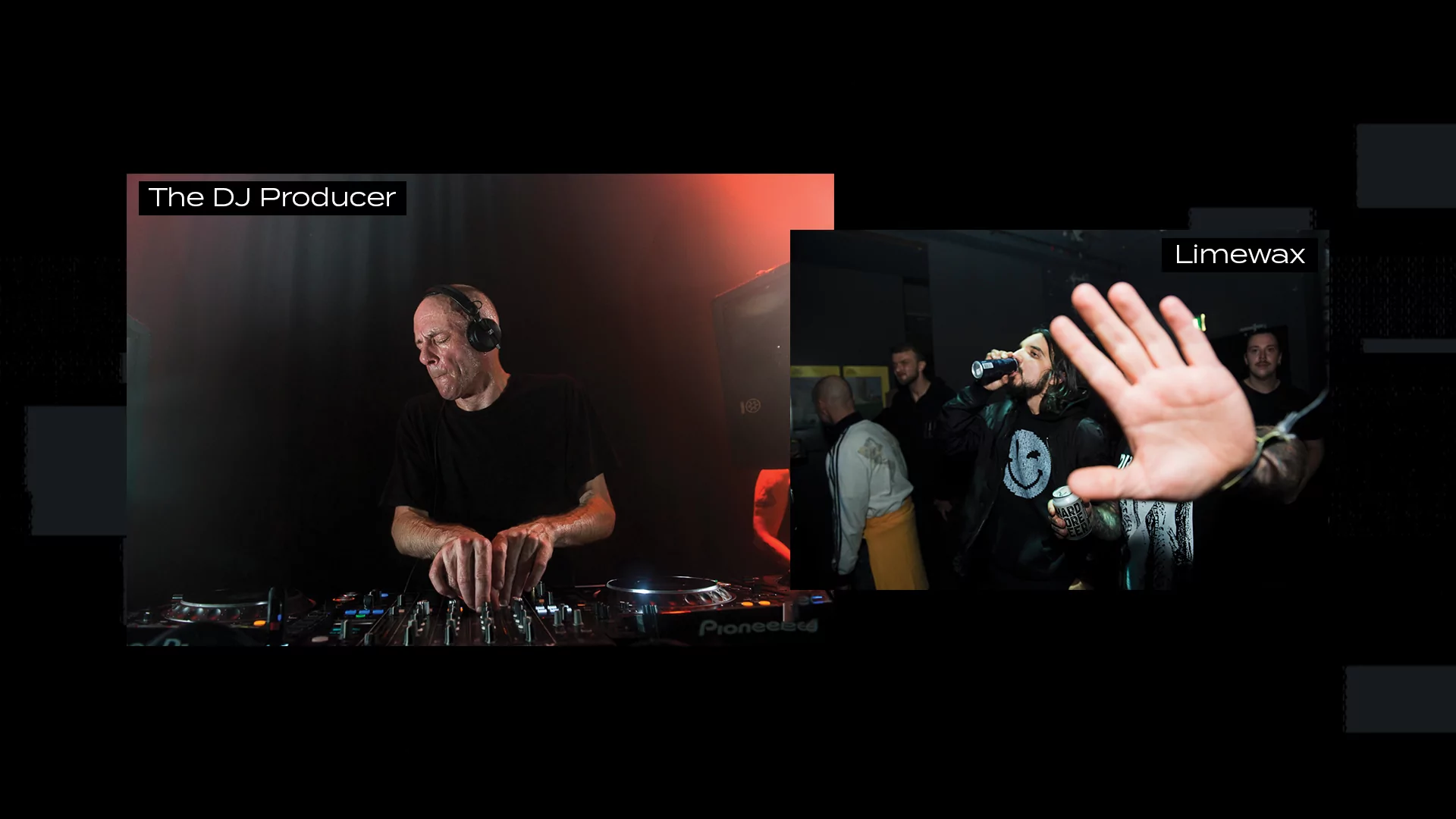
And they do. “It’s literally the perfect label for me,” says Deathmachine, another UK hardcore techno veteran inducted via XTRM. “I joined PRSPCT quite a few years ago now, but I’ve never felt more comfortable with the label. They trust what I wanna do.” Based in the Midlands, Deathmachine’s 2021 PRSPCT album ‘Mutability’ is a masterstroke of cross- pollination, a savage and stunning concoction of distorted hardcore, d&b futurism and cinematic grandeur that spans a vast range of tempos.
“Maybe that’s why the album came out so well, because I just felt so at home there, it just gave me absolute freedom to do what I want to do,” Deathmachine continues. “Gareth is really encouraging and trusting with our art. He doesn’t encroach on what he thinks you should sound like, he gives you the room to sound like you should sound. It’s something I’ve never experienced before. Other labels, they’ll be like, ‘Oh, you need to do something like this again because it was successful’. Gareth doesn’t really care so much about success. He wants the artists to do their best, and that then by definition brings success, but in a more natural way.”
Andrew Bowen first joined PRSPCT as one half of techno act AnD, but after going solo as Slave To Society — under which he makes rugged industrial-techstep-breakcore mutations — PRSPCT continued to back him as a label and agency artist. “It really means a lot to me,” he says. “I’ve respected the label and the artists involved for 20 years! So to be involved with everyone now is really exciting and humbling. Being surrounded by the best gives you even more drive as an artist to keep pushing boundaries and improving.”
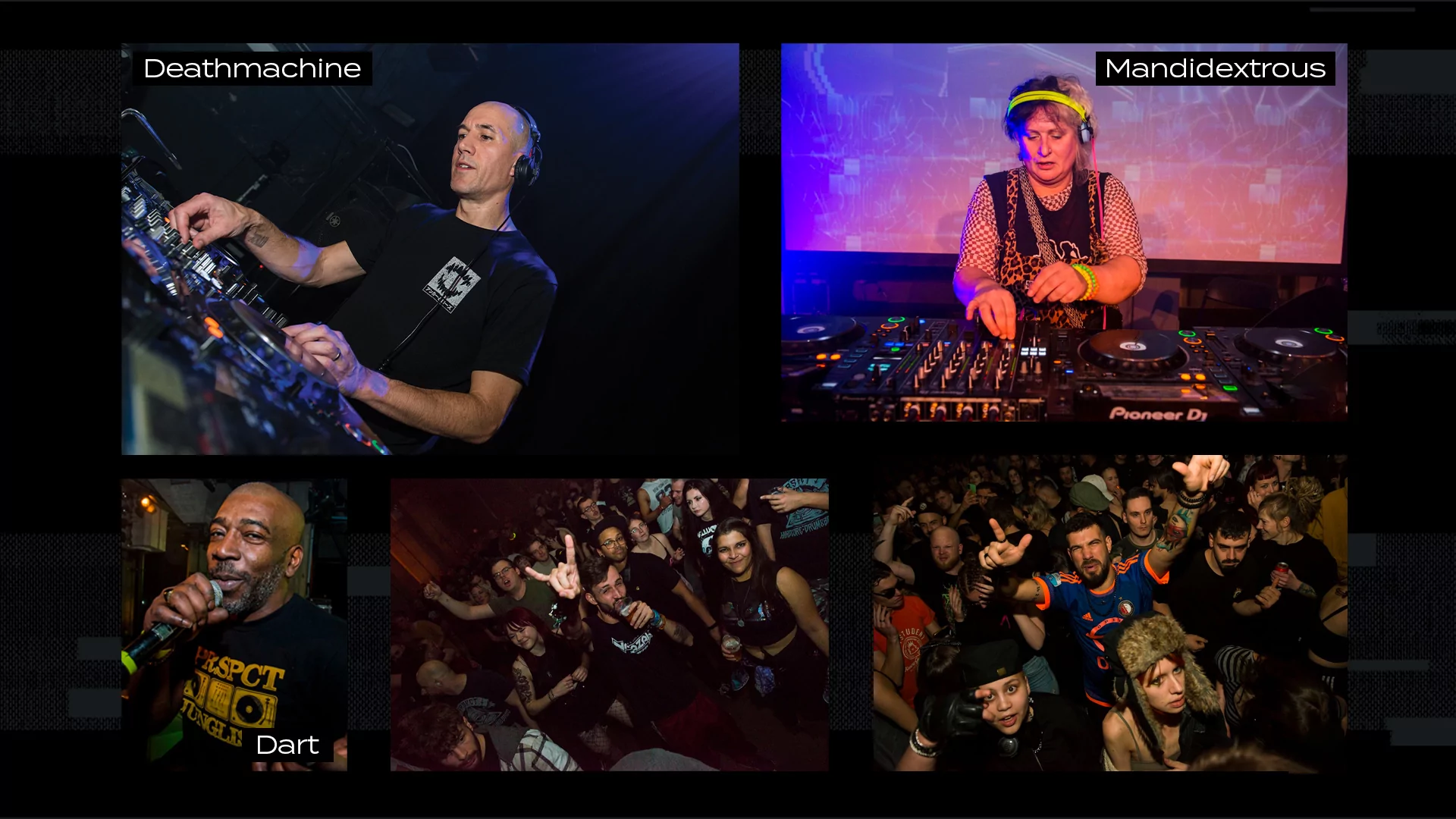
For Adi-J, Gareth’s suggestion that she collaborate with another PRSPCT staple, Lucy Furr (also known as Adamant Scream), was a game changer. “He convinces you because he believes in it — and he’s right,” Adi enthuses. She explains how this ethos extends to the XL events, where — though she’s primarily a d&b DJ — she feels she can play anything. “There’s no rules, there’s no limits, there’s no solid ideas of what you should do, how you should do it, who’s gonna like it, who’s not gonna like it,” she continues. “At the Maassilo, it’s so raw... it’s so big. You have no identity anymore. You don’t know who you are, who your friends are... even when you come to play, it’s like you do a delete for everything you ever knew, and you start again, which is wonderful. It’s very refreshing... it’s one of these places that people always come to you after your set and they’re like, ‘Oh I never come to these kinds of parties, but a friend took me and it’s all crazy, and I loved your set, and it’s something completely different than what I expected’.”
As Adi puts it, Gareth is good at “breeding” music, a phrase that brings to mind another term often associated with PRSPCT: crossbreed. Describing music that takes equal influence from hardcore and drum & bass, the crossbreed sub-genre generates mixed feelings online, but PRSPCT is regularly touted as one of the sound’s key labels. Gareth, however, is less than keen. “Sometimes I hear like, ‘PRSPCT’s the No.1 crossbreed label’, and I’m like, ‘Dude, we’re not fucking crossbreed’. We’re not even a hardcore label. We’re not even a drum & bass label.”
This may sound odd for a man who openly professes his love for hardcore and drum & bass, who releases a lot of both on his label and hosts some of the biggest artists from both at his events. However, it reflects Gareth’s wider vision of PRSPCT as a place for free expression and in particular the direction he’s been taking PRSPCT since the pandemic.
By the time Covid shut down the world, the aforementioned sub-labels had been joined by the techno-centric SSSPCR and new-talent imprint Fresh Meat. After nearly 18 years of full-throttle expansion, given the time to focus solely on the label, Gareth decided the offshoots had to go.
“I love so much different music and the way I treated it all in my head [was], if it’s good music it’s good, and that’s what I wanna do. So I was thinking for a while I need to quit all these sub-labels, ’cause every release for me is as important, and I noticed that probably 50% of the people buying the records would buy the RVLT and normal and XTRM anyway,” he says. “Also, I love what Warp did back in the day; they also didn’t give a fuck, it was all these different genres, and I thought, ‘I wanna be that but for the rougher edge of stuff’.”
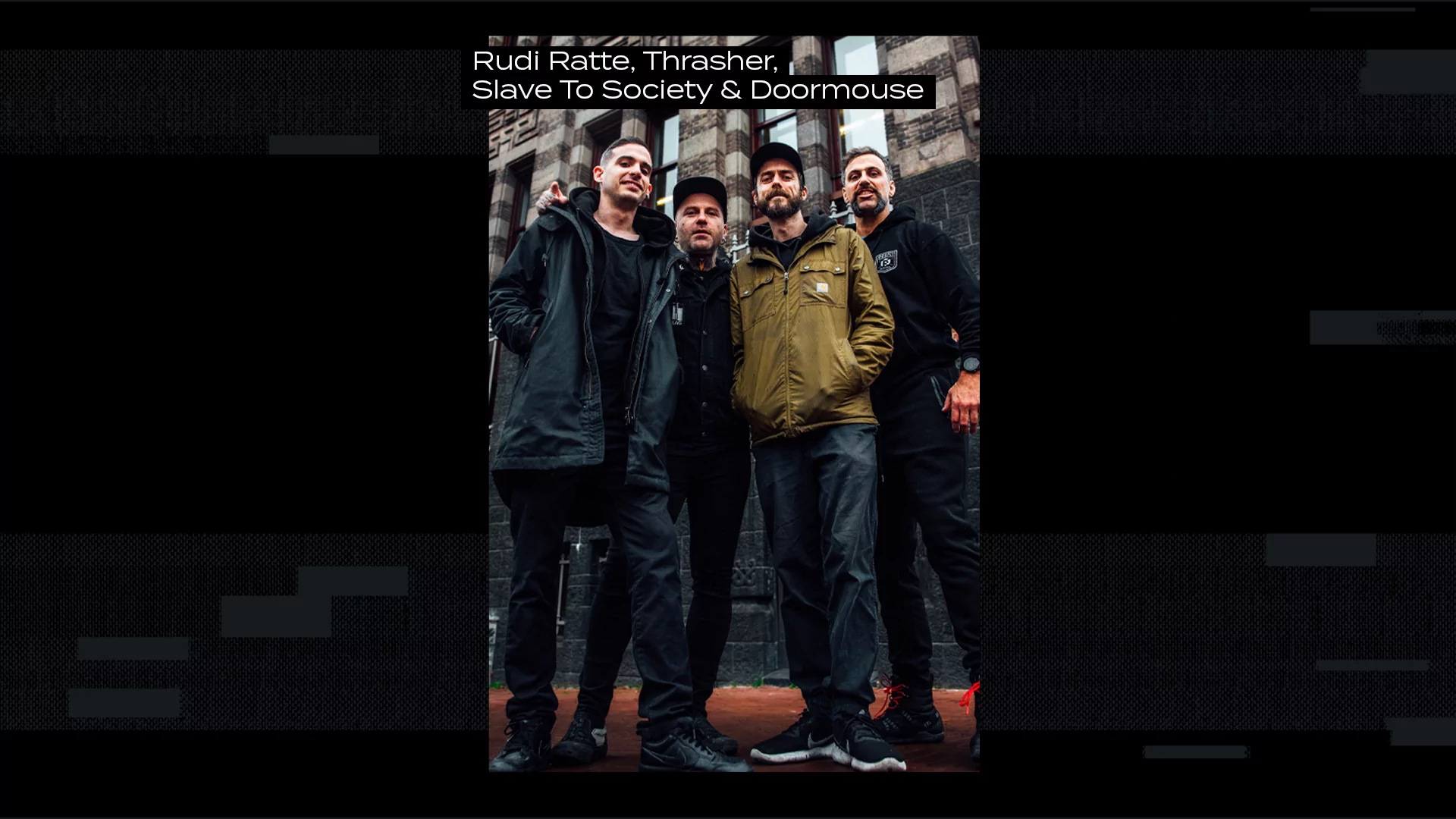
“It should not matter if you like drum & bass or hardcore or whatever. If you like to rave, you like to have a good time, you like to listen to a different kind of music, but that has the same energy, that has the same soul [then PRSPCT is for you].” – Rudi Ratte
At the start of 2021, all the sub-labels were dissolved and PRSPCT became one truly anything-goes outlet — all sounds under one roof. The move served to blur perspectives of what PRSPCT is, opening it up to a wider fanbase and dodging any boxes others put it in mentally.
“I think [the label] has a really big impact, but not everybody is aware of it,” says Stefan Gabalin, aka Rudi Ratte. Originally from Northern Italy, he moved to Rotterdam to study in the ’10s and became embedded in the PRSPCT crew. Now he and Gareth are like two peas in a pod, and he’s one of three other staff that are officially employed by PRSPCT. “Now we are trying to be more open and incorporate other people from other kinds of scenes,” Stefan continues, “because people like Coco Bryce, they [play] Dekmantel, they are our people... but I dunno how many people in that crowd know that they are PRSPCT. Or Rebekah plays a lot of PRSPCT tunes, but how many people know that these are PRSPCT?”
By bringing everything under one clear PRSPCT banner, he hopes the label will become accessible to a broader audience. “It should not matter if you like drum & bass or hardcore or whatever,” he says. “If you like to rave, you like to have a good time, you like to listen to a different kind of music, but that has the same energy, that has the same soul [then PRSPCT is for you].”
Another way he’s achieving that is through PRSPCT Radio, a 24-hour online station launched during the pandemic. Filled with a mixture of shows, playlists and podcasts, it offers all the typical PRSPCT fare and much more — like techno artist Bleaching Agent playing disco or Mord associate Charlton spinning footwork and juke. “During the Corona times, we were streaming live every day for 200 days or something,” explains Stefan. “I like all kinds of music and that’s really my platform where I can do that.”
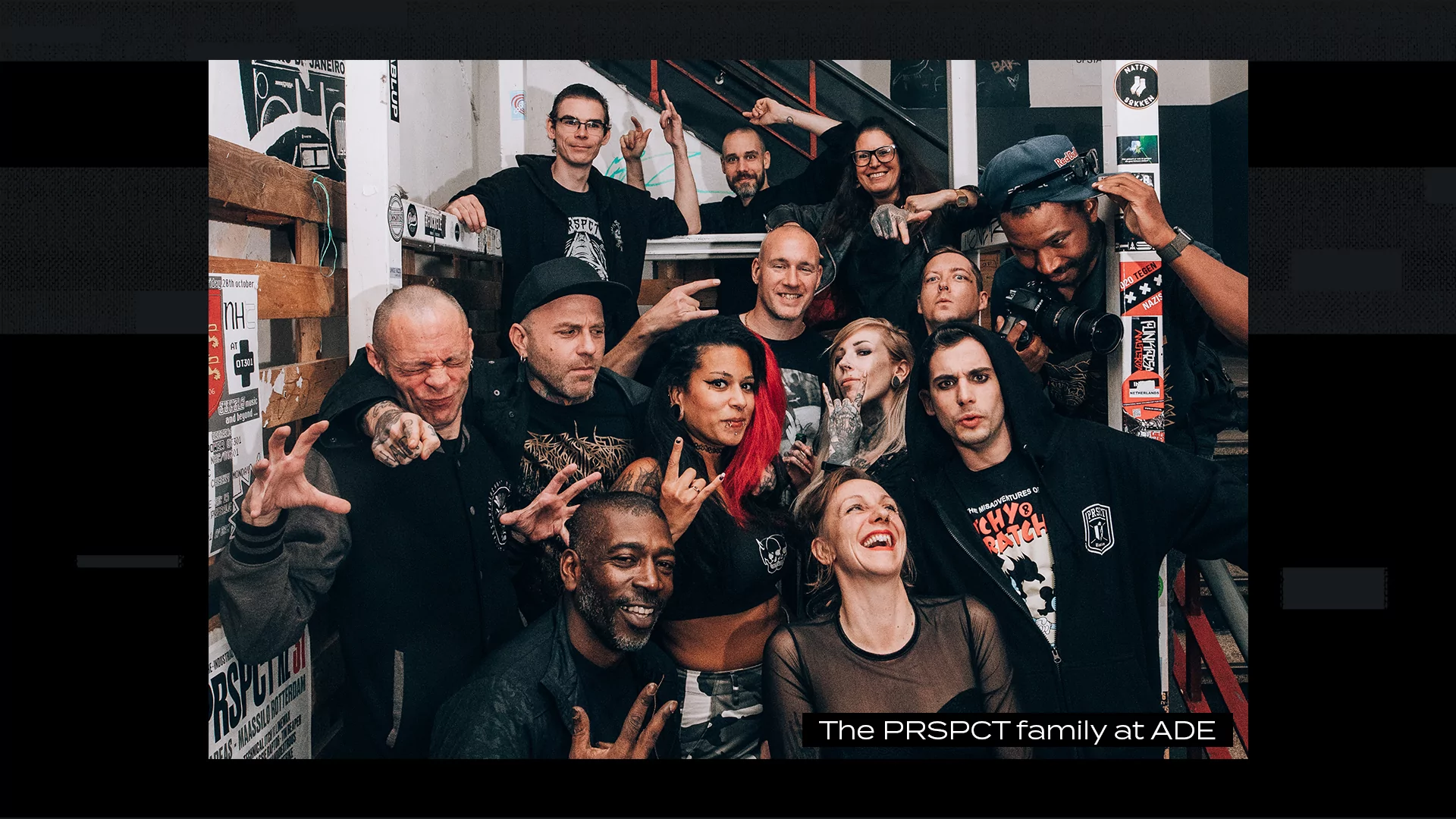
PRSPCT’s broadening of its remit has been applied to its agency wing too, which was recently renamed to RVLT to allow it to properly represent non-label artists. “Not everybody was happy about the name change, because for them it’s like, ‘But we’re PRSPCT artists’,” recalls Gareth. “But that’s where I said, ‘Yeah, but listen, you’re still PRSPCT artists, it’s just the agency represents more than PRSPCT artists’.”
The change also aims to remove any stigma around booking PRSPCT artists. “When it comes to the agency, the roster is very diverse,” Gareth continues. “But there are people that think PRSPCT just stands for hardcore and drum & bass, while we also do bookings for FFF, who does jungle, and for Doormouse, who... I don’t even know what you call that kind of music!” Dart is a big supporter of the move. “It’s just a name change, but a little bit of a different way of approaching things,” he says. And those who were initially unsure eventually came round.
“Luke, [The DJ] Producer, he sent me a really cool message about it, because he was at first a bit like, ‘Oh, but I love being a PRSPCT artist’,” says Gareth. “But then he sent me this print screen of what revolt means...” He begins to read the definition from Google. “‘Take violent action against an established government or ruler, rebel. Cause to feel disgust. An attempt to end the authority of a person or body by rebelling, a revolt against oppressive rule.’ He’s like, ‘Now I get it!’ We’re working for the outsiders and the rebels and the weirdos, so the name actually makes sense.”
Beyond its boundary-pushing artists, representing those who lack representation has always been a part of PRSPCT. “I incorporated what I learned from the DIY punk movement, the whole ethics of it — we’ve always been very leftie in a way,” says Gareth. Whether that’s supporting refugees with charity compilations, combating misogyny and homophobia with artwork and visuals, or working with not-for-profit collectives like Amsterdam’s OT301 venue, standing up for what’s right is essential.
“When you’ve got a platform, use it. Too many artists are afraid of losing likes or fans from saying something,” he continues. With 20 years of PRSPCT behind him, Gareth doesn’t seem to be afraid of anything, and the future looks more promising than ever. “We’re focusing a lot on albums,” says Gareth, “because this way we can push artists to go full-force crazy and bring a story, and not have to write bangers. You just need two or three that work on the dancefloor and the rest? Make your fucking story; let your weirdness reign.”
